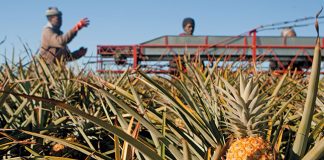But according to economist Dr Roelof Botha, the sector needed to grow to create jobs. He said this would be difficult, given that labour unrest and labour restrictions were among the greatest threats to agricultural and rural development. He was taking part in a debate hosted by the organisers of Agri Mega Week, Standard Bank and Santam, on job creation in agriculture, held in Bredasdorp recently.
“The labour market environment in SA is characterised by the use of inflammatory rhetoric from certain trade union leaders, and an adversarial approach towards wage negotiations.” Botha said union members were encouraged to behave in a lawless manner during strikes when malicious damage to property and incidents of arson, assault and murder appeared to be condoned.
“Labour cost far outstrips labour productivity, and unrealistic labour laws and wage demands have led to the decimation of employment in agriculture with 500 000 jobs lost in the past 15 years,” said Botha. He added that SA’s global competitiveness had been systematically eroded.
Hans van der Merwe, executive director of Agri SA, iterated much of what Botha said, adding that if changes were not made to SA’s labour policies, the objective to create a million jobs in agriculture would not be realised. “The environment in which agriculture has to function in terms of labour legislation, makes it difficult for the sector to contribute to job creation,” he said. “There’s a huge gap between the expectations of government in terms of agricultural labour, and the period in which these expectations can be met, compared with the real potential of the industry under existing legislation.”
Botha said it was “absolutely impossible” for the NDP’s targets to be met if “there is a tendency to treat employees as if they were not part of the game”. A number of speakers offered possible solutions for strengthening the relationship between labour and the agricultural sector. Anthony Dietrich of the South African Wine Industry Trust (Sawit) and David Esau, business unit manager for the Western Cape inspection and enforcement unit (a branch of the Department of Labour), insisted there was a need to form a collective bargaining platform for agriculture labour issues.
This suggestion was opposed by Van der Mewe and Louw Steytler, chairperson of Grain SA, who said a “one size fits all” solution would not solve labour problems or enable the sector to create more jobs. Van der Merwe said the various agricultural industries differed too much from each other to allow collective bargaining.
Follow Denene on Twitter @agri_erasmus












